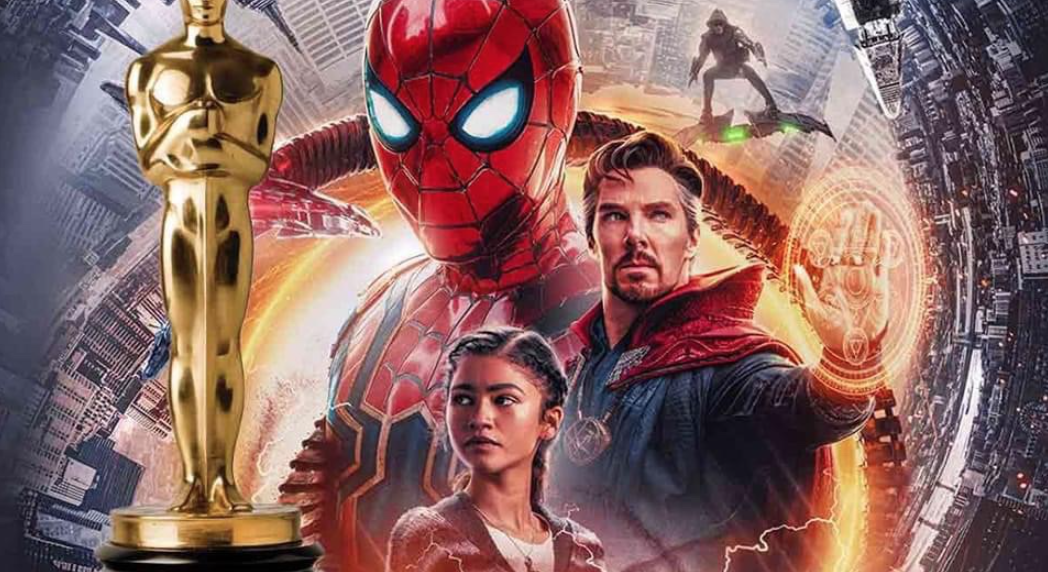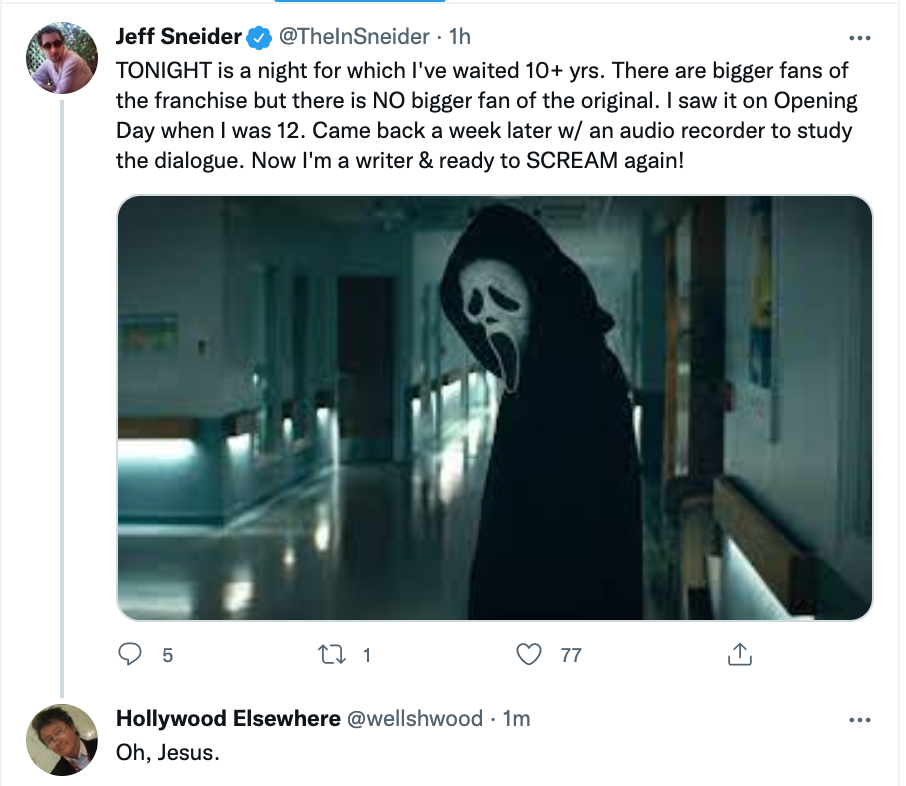
Day: January 11, 2022
“Then Why Are We Dawdling?”
Gal Gadot as a facsimile of Grace Kelly? Or will she play Cary Grant‘s John Robie?
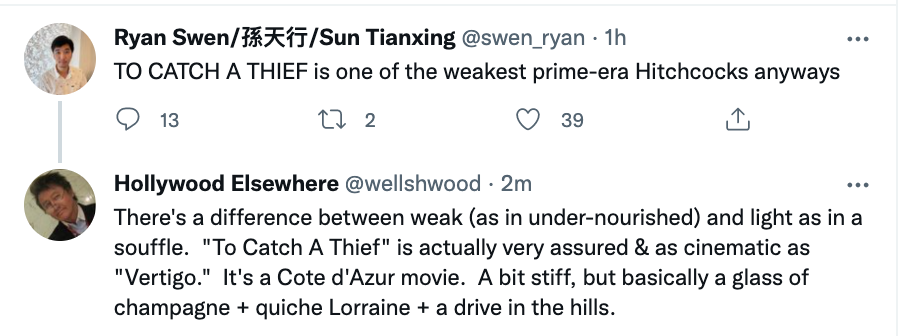
Voices That Make You Flinch
HE follower “Jeff” suggested listening to a Big Picture podcast about Licorice Pizza. The hosts are Sean Fennessey and Amanda Dobbins; the guests are Chris Ryan and Wosny Lambre.
Naturally they focus on the age-inappropriate relationship between Cooper Hoffman and Alana Haim (respectively playing an ambitious 15 year-old actor and a floundering, ambivalent 25 year-old woman who lives with her parents) and the John Michael Higgins racial insensitivity thing blah blah.
“Jeff” thought I might enjoy a brief passage around the 49-minute mark in which Wosny shrugs at the age-inappropriate thing. I rolled my eyes, couldn’t have cared less.
What really happened is that I got hung up on the voices. Not Fennessey — a stable, sensible-sounding guy — but Dobbins and her uptalky, vocal-fry, Valley Girl-ish (I hate it when people say “becuzz” rather than “because”), and Wosny pronouncing absurd as “ubbsurd” and saying “bayzigally”…stuff like that. And too often my two least favorite words in the dictionary — “incredible” and “amazing” — are used to convey enthusiasm.
Some Millennials, man. Chalk on the blackboard.
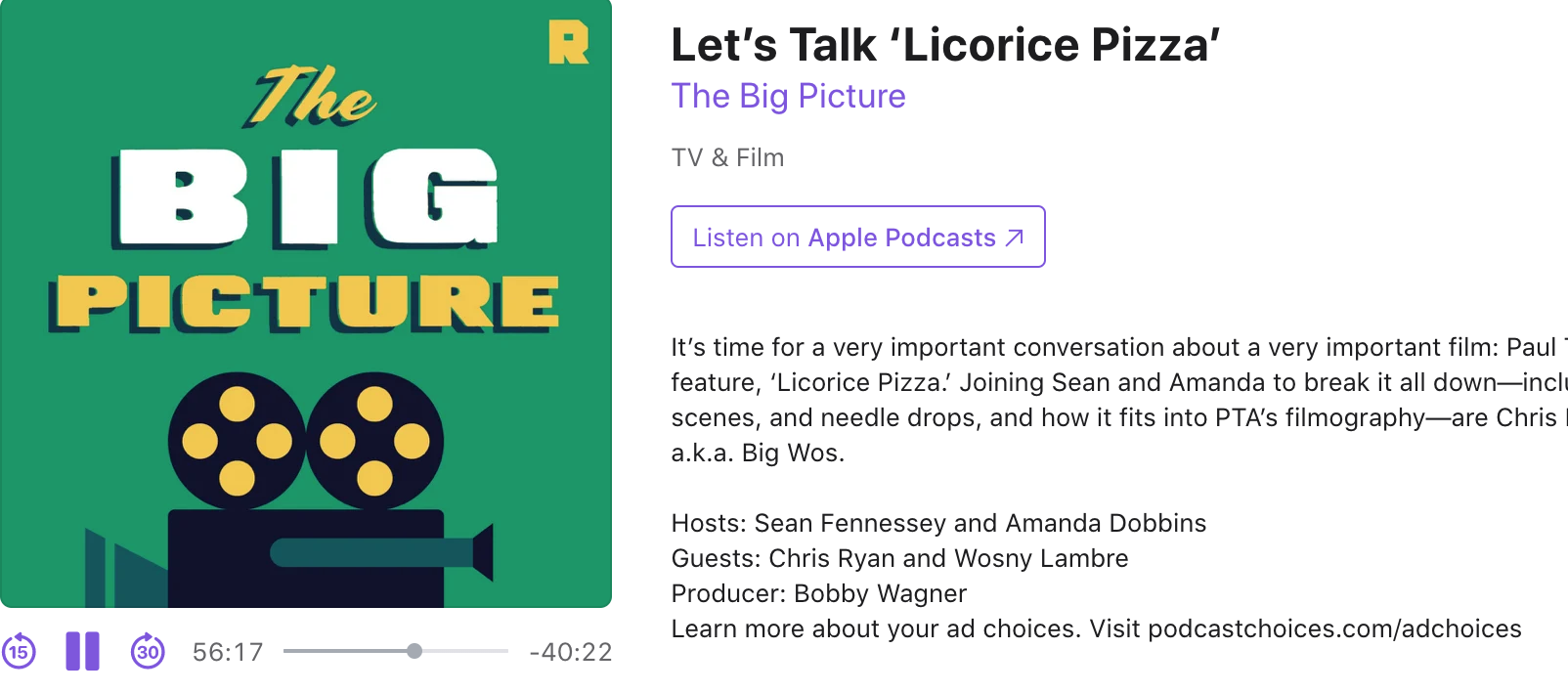
Common Sense Hollywood Assessment
Herewith some HE reactions to “Hollywood’s New Rules,” a just-posted article by Peter Kiefer and Peter Savodnik, and excerpted in a 1.11.22 HE article titled “Hollywood Is a Woke Prison Colony“:
It’s “interesting” and approvable that Keifer and Savodnik have managed to cobble together a portrait of totalitarian woke terror in Hollywood (inclusive hiring mandates, BIPOCS are saintly and sainted, cultural shifts, only white guys get punched down upon, the Academy’s “woke house” museum).
But of course, this is nothing that hasn’t been noted or noticed or mentioned in a hundred different ways by Awards Daily or Hollywood Elsewhere or George Orwell or, in their private, never-to-be-publicly-acknowledged realms of inward meditation, any number of industry veterans with half-honest inclinations, at least with themselves.
Keifer and Savodnik have based this article upon traditional shoe-leather and notepad reporting (including actual on-the-record sources like Howard Koch, Jr. and Sam Wasson), and that is commendable.
But you can also sense or sniff out the presence of scores of creatives and producers and screenwriters and peripheral, lower-level sources who were too terrified to even answer K & S’s emails, texts and phone calls.
This is a good article but the notion of a massive class-action, anti-discrimination suit by Hollywood white guys? That’ll NEVER happen…please.
I’m assuming that the unnamed editor-in-chief of The Hollywood Reporter, referenced in the opening paragraph, is Matt Belloni, whose precise title between ‘17 and ‘20 was “editorial director”. The source of this story was a THR employee who heard Belloni’s pitch and noted the derisive responses of THR staffers. It certainly wasn’t Belloni himself.
The piece is primarily composed of scraps and inferences and tidbits. Yes, Keifer and Savodnik have only scratched the surface. They certainly haven’t found a Hollywood equivalent of a Howard Beale or a Jay Bulworth who doesn’t give a damn and is just coughing up the real truth and let the chips fall where they may. But it’s a good honest stab at “the terror.”
Hollywood Is A Woke Prison Colony
From “Hollywood’s New Rules,” a just-posted article by Peter Kiefer and Peter Savodnik, available via Bari Weiss‘s “Common Sense” Substack:
“Hollywood, like many industries, does have a clubbiness about it. And pretty much everyone on the inside insists it should open up to those who had, for decades, been kept out. But the heavy-handed mandates, the databases, the shifting culture — in which pretty much all white men were assumed to have gotten their jobs because they had the right tennis buddies or ZIP code or skin color — raised the possibility of a new kind of clubbiness.
“The result has not just been a demographic change. It has been an ideological and cultural transformation. We spoke to more than 25 writers, directors, and producers — all of whom identify as liberal, and all of whom described a pervasive fear of running afoul of the new dogma. This was the case not just among the high command at companies like Netflix, Amazon, and Hulu, but at every level of production.

“How to survive the revolution? By becoming its most ardent supporter. ‘Best way to defend yourself against the woke is to out-woke everyone, including the woke,’ one writer said. Suddenly, every conversation with every agent or head of content started with: Is anyone BIPOC attached to this?
“Maybe it’s 15 percent about the belief that it will bring more people into viewing content, and 85 percent about the fear of being attacked on social media or in places like the Hollywood press or The New York Times,” a writer and producer said.
“You’ve got to be insane not to have at the forefront of your mind all of these racial and gender and trans issues when you’re writing something. You have to worry about the impact that everything you do will have on your career. And that has an obvious chilling effect on creativity.”
“There was a feeling, among those who didn’t hew to the new orthodoxy, that it was becoming harder not only for certain people to find work but for a certain kind of content — ballsier, more provocative — to get made.
“They were scared of what was happening. The fear, one prominent director said in an email, is ‘the audience stops trusting us. They begin to see us as a community twisting ourselves into a pretzel to make every movie as woke as possible, every relationship mixed racially, every character sexually fluid, and they decide that we are telling stories set in a fantasyland instead of a world they know and live in. If that happens, and they decide to throw themselves instead into video games 24/7, we will lose them.'”
The audience will stop trusting us? Baby, that train left the station four or five years ago, minimum, if not earlier.
Again — Chappelle Is The Only Choice
The Hollywood Reporter‘s Scott Feinberg is reporting that the 94th Academy Awards, slated to air on 3.27.22, will have a host — the first since the 90th Oscars aired in 2017.
And if the Academy honchos understand anything about the culture and how sick people are of Hollywood’s woke bullshit, they’ll go to Dave Chappelle on their knees and beg him to accept the gig. Please, bruh…we’ve gone insane over the last four or five years and have fucked ourselves royally…we’ve isolated ourselves from most of the ticket-buying public, and we need you to save us from our own viral insanity.
The trans community will scream in protest if the Academy taps Chappelle, and that’s fine because Joe and Jane Popcorn don’t give a shit. Nobody wants to give trans people any kind of hard time, but their banshee shrieking and howling is not a popular tune on the hit parade.
Feinberg reminds that Spider-Man: No Way Home star Tom Holland “has expressed interest in hosting the Oscars, and “that the Academy did reach out to him to explore that possibility.” Please, dear God…no!
Whoever is chosen to host the 94th Academy Awards will be investigated by Woke Twitter, and if the prospective host has ever said one “wrong” thing in an interview or tweeted one “incorrect” thing they’ll be killed…dragged and eviscerated and disemboweled by wild dogs. Which is another reason why Chappelle is such a great choice. The twitter wolves have already gone after him and done everything they can to take him down, and he’s still standing.
Definitive “Spider-Man” Best Picture Endorsement
Click here to jump past HE Sink-In
I’ve been a Marvel Cinematic Universe skeptic for several years now. I’m not a confirmed hater because of Joe Johnston‘s Captain America (’11), Peyton Reed‘s Ant Man (’15) and Anthony and Joe Russo‘s Avengers: Endgame (’19), all of which I was down with. But otherwise the MCU has been darkening my brow for some time, and until recently the second Spider-Man reboot, in particular, rubbed me the wrong way.
Five years ago I posted an angry rant about the then-forthcoming Spider-Man: Homecoming, the first Tom Halland reboot. “I don’t want to see this,” I kvetched and moaned. “I really, really don’t. Who’s with me? That was a joke. The studios crank out another and the herd comes right over and starts slurping. I’ve loved a few Marvel flicks, okay, but c’mon, man…enough.”
Two years later (i.e., early 2019) I wrote how turned off I was by the prospect of sitting through Spider-Man: Far From Home. “Sending a superhero to Europe to liven things up, needless to point out, is a sure sign of franchise fatigue,” I declared. “The idea of Hydron, lord of the waters, wreaking CG havoc upon poor Venice, Italy…to paraphrase Frank Gorshin‘s version of Kirk Douglas, the very idea makes me sick to my stomach.”
Roughly two months ago I turned up the volume. “I hate everyone and everything connected to Spider-Man No Way Home,” I wrote. “Okay, I don’t really mean that. I hope the film makes money and those who like to sit through this crap will feel satisfied or at least placated. But if I could erase the Spider-Man cinematic universe from everyone’s consciousness by clapping my hands three times, I would definitely clap my hands three times. Maybe that means I do hate everything connected to it.”
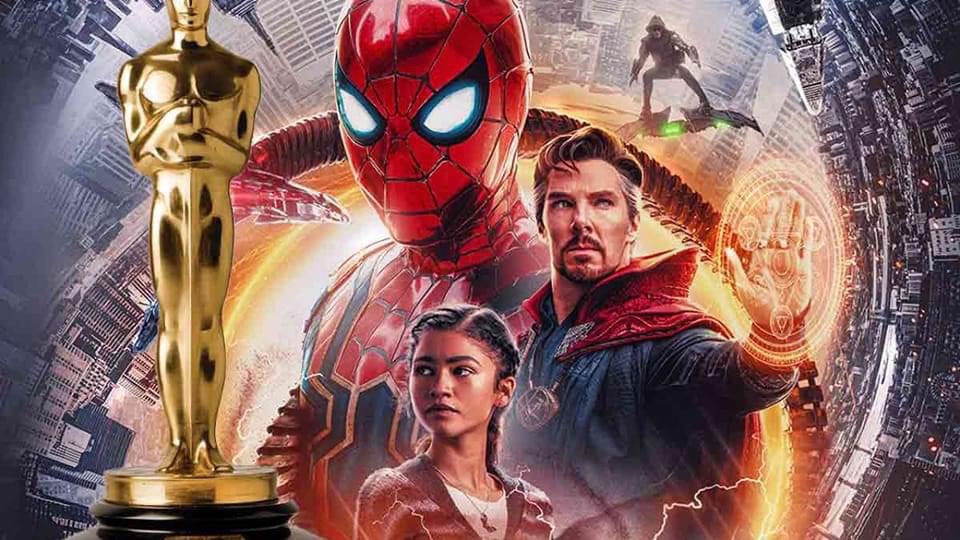
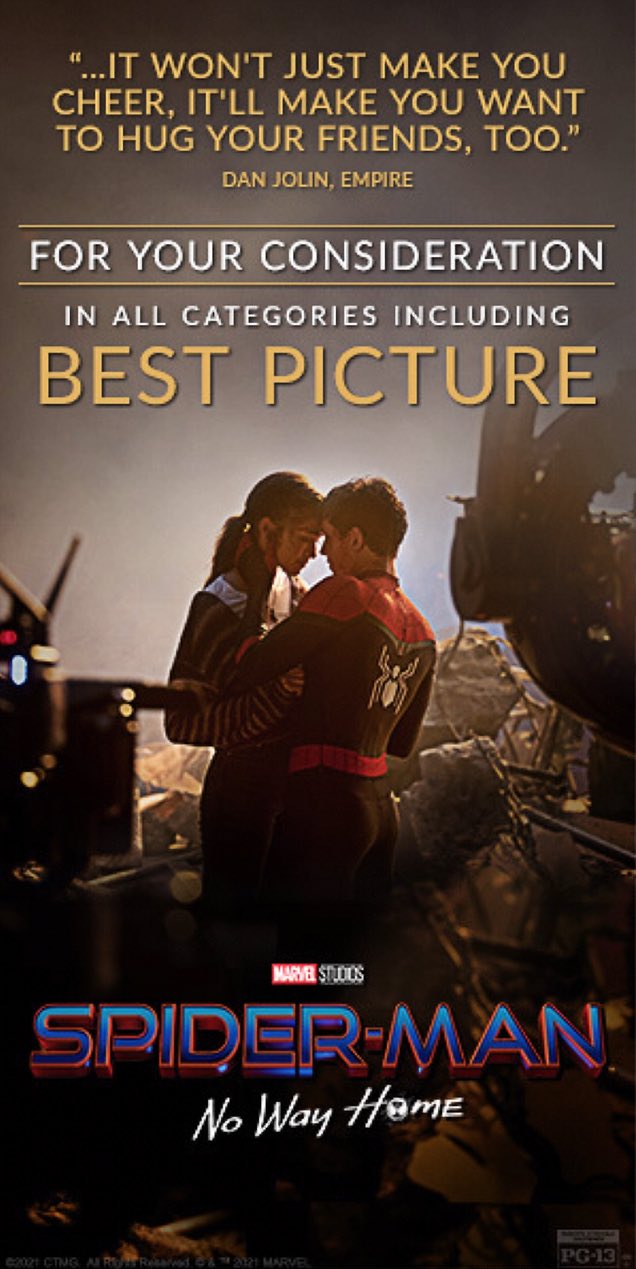
And then, as Joseph Heller once wrote, something happened.
On Thursday, 12.16 I caught a 7 pm showing of Spider-Man No Way Home at the AMC Grove. A couple of hours later I was shocked to admit that my concerns about Jon Watts, Chris McKenna and Erik Sommers‘ film were unfounded.
I’m not saying I was 100% delighted with the first half of it. But a tiny bit later everything started to change and advance and coagulate, and the trippier, hall-of-mirrors aspects of the “multiverse” plot started to kick in, and the movie got quieter and more reflective and then joyful…the crowd broke out in cheers three times…and I was suddenly going “holy shit, this is really working!”
I drove home in a state of pleasant disorientation. At 10:45 pm I tapped out two surprising statements. I wanted to sound cool and dry and circumspect, but I couldn’t stop myself.
(1) “Unlikely as this may sound, it is HE’s conviction that McKenna and Sommers’ SM:NWH script has resulted in one of the most cosmically out-there meta-Marvel experiences ever, not exactly logical but one of the most emotional Marvel sink-ins (and that includes Avengers: Endgame).”
(2) “As much as I hate to admit this, Spider-Man: No Way Home is easily one of 2021’s best films. It actually should be nominated for Best Picture because it turns the proverbial magic key — it turns audiences on. I was there and I felt it, dammit. This is what people go to the movies for. It even ends a little bit like Warren Beatty‘s Heaven Can Wait…almost. I’m sorry but the last 45 to 50 minutes are really good. I was totally sold. Call me flabbergasted. At the finish, everyone applauded.”
In other words (and I’m sorry for using eight paragraphs to get to this point), the fact that a skeptic and an in-and-out hater and sour-attitude guy like myself…the fact that I pretty much melted down and dropped to my knees in praise of the second half of Spider-Man: No Way Home and am now sincerely urging that the Academy nominate it for Best Picture Oscar…well, this means something. It really does.
I’ve been watching movies professionally and taking the pulse of this industry for more decades than I’d care to admit to, and I know what it feels like when a film connects…when it hits that sweet spot and lifts the spirits of an audience and injects a feeling that is rare and special. It happened to me on 12.16.21, and it’s been happening to tens of millions of ticket-buyers since Spider-Man: No Way Home opened. It’s now the sixth-highest-grossing film in history in North America, and has taken in over $1.5 billion worldwide.
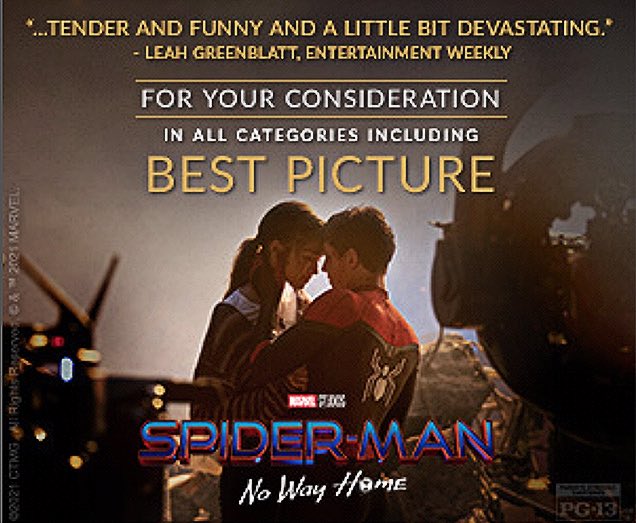
Does this mean Spider-Man: No Way Home deserves a Best Picture nomination for profits alone? Because it’s earning a phenomenal amount of theatrical revenue at a time when the future of theatrical is in doubt worldwide, especially with the latest Covid assault making things all the more difficult for theatres to stay afloat? No, I wouldn’t say that.
But the emotional feeling that led to this wild box-office tsunami…the spiritual surge that resulted in this astonishing popularity does merit a Best Picture nomination, mainly because no other 2021 film has come close to creating it.
And here’s what that vibe, that surge, that feeling is actually about. Sappy as it may sound, the second half of Spider-Man: No Way Home is about forgiveness and family. Has there every been a superhero film in which the protagonist tries to release the villains from their rotten karma and give them a second chance? Not to my recollection. And when have the blessings of family felt more welcome and tangible — the saga of a young adult whose difficult struggle is aided and soothed by the arrival of two uncles?
Before I began writing this I was telling myself there are two family films in 2021 Best Picture contention — Belfast and King Richard. It was only when I was halfway through this essay that the truth hit me — Spider-Man: No Way Home makes for a third, and it offers the warmest family embrace of all. And that‘s why it’s a Best Picture contender, you bet. Ask any non-cynic (i.e., not David Poland) who’s seen it. The proof is in the pudding.

